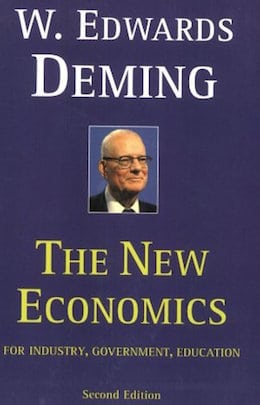By John Hunter, author of the Curious Cat Management Improvement Blog.
W. Edwards Deming included this example of businesses cooperating with competitors in The New Economics for Industry, Government, Education:
My automobile, sitting in front of my house, would not start. I called Bill at the Exxon station not far away. When the man from the Exxon station came, I noted that he was in a truck owned by his competitor across the street.
How smart these people are, I perceived. Each station owns one truck. By borrowing the competitor’s one and only truck, if it be idle, both stations provide to their customers service equivalent to ownership of perhaps 1.8 trucks, at the cost of owning only one. Advantages: these stations both retain business of customers at lowest cost. Even further cooperation: one station stays open late one night, the other stays open late the next night.
It is a great example, showing how it is possible to find solutions that help business and customers by thinking in unconventional ways. These types of cooperation are not unheard of but I think we could benefit from more thought given to ideas that initially make us think it is an unworkable and crazy idea.
I was actually reminded of this idea by a headline on two American football teams being willing to share a new stadium near Los Angeles if they can’t get individual stadiums built (with huge funding from taxpayers) near their current location.
Now in the stadium example I fear it is mainly a negotiating tactic to back their current cities into providing huge concessions. The concessions local governments grant for stadiums are widely seen by economist as foolhardy: I agree. But if the choice is between wasting lots of taxpayer money on 2 stadiums or doing so on 1 stadium, closing 1 stadium they share is the lessor of two bad options. The correct option is to let them build the stadium if it is economically wise without taxpayer giveaways. The New York Giants and New York Jets share a stadium in New Jersey.
The idea of finding cooperative solutions with competitors is something I support. As with most any strategy there are considerations that impose limits on how far things can go. Cooperative solutions have to be found that benefit each competitor and also that benefit customers. In the USA, and most other places I would imagine, there are legal limits on collusion to harm consumers with anti-competitive agreements.
In a previous post we discussed how, in applying Deming based management principles as a business strategy, Hallmark Building Supplies cooperated with customers (some of which were also competitors). That post also includes a webcast of Louie Paynter discussing his experiences.
I think examples of these cooperative solutions with competitors from our readers would be of interest to all of our readers. Please share examples from your organization with us by including a comment below.
Related: Tyranny of the Prevailing Style of Management – Dr. Deming Video: Managing the Organization as a System – Managing the Supplier Relationship (a systems view)



